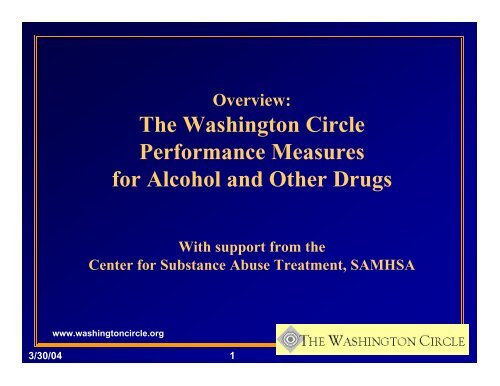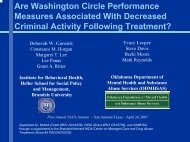Overview - The Washington Circle
Overview - The Washington Circle
Overview - The Washington Circle
Create successful ePaper yourself
Turn your PDF publications into a flip-book with our unique Google optimized e-Paper software.
<strong>Overview</strong>:<br />
<strong>The</strong> <strong>Washington</strong> <strong>Circle</strong><br />
Performance Measures<br />
for Alcohol and Other Drugs<br />
With support from the<br />
Center for Substance Abuse Treatment, SAMHSA<br />
www.washingtoncircle.org<br />
3/30/04<br />
1
<strong>Overview</strong> of Presentation<br />
• <strong>Washington</strong> <strong>Circle</strong> history<br />
• Substance abuse performance measures<br />
• Challenges in calculating measures<br />
• Next steps<br />
www.washingtoncircle.org<br />
3/30/04<br />
2
<strong>Washington</strong> <strong>Circle</strong> History<br />
• Convened by SAMHSA’s Center for<br />
Substance Abuse Treatment (CSAT) in<br />
March 1998<br />
• Group of national experts<br />
• Guided by 15 person policy committee<br />
• Biannual meetings supplemented by<br />
conference calls<br />
• Technical support by Brandeis University<br />
(through Brandeis/Harvard NIDA Center)<br />
www.washingtoncircle.org<br />
3/30/04<br />
3
<strong>Washington</strong> <strong>Circle</strong> Policy Group Members*<br />
Frank McCorry PhD, Chair<br />
New York State Office of Alcoholism and Substance Abuse<br />
Thomas Babor PhD MPH<br />
Dept. of Psychiatry<br />
University of Connecticut Health Center<br />
John Bartlett MD MPH<br />
<strong>The</strong> Forum on Performance Measures<br />
Mady Chalk PhD<br />
Division of Services Improvement<br />
Center for Substance Abuse Treatment<br />
Doreen Cavanaugh PhD<br />
Institute for Healthcare Research and Policy<br />
Georgetown University<br />
Allen Daniels EdD<br />
Alliance Behavioral Care<br />
Spencer Falcon MD<br />
Private Healthcare Systems, Inc.<br />
Deborah Garnick ScD<br />
Schneider Institute for Health Policy<br />
<strong>The</strong> Heller School, Brandeis University<br />
David R Gastfriend MD<br />
Addiction Research Program, Mass. General Hospital<br />
Dept. of Psychiatry, Harvard Medical School<br />
www.washingtoncircle.org<br />
Suzanne Gelber PhD<br />
SGR Health, Ltd. and the Avisa Group<br />
Patricia A Harrison PhD<br />
Minnesota Dept. of Health and Family Support<br />
Constance Horgan ScD<br />
Schneider Institute for Health Policy<br />
<strong>The</strong> Heller School, Brandeis University<br />
Keith Humphreys PhD<br />
Veterans Administration, Stanford University<br />
A Thomas McLellan PhD<br />
Treatment Research Institute<br />
Constance Perchura PhD<br />
Robert Wood Johnson Foundation<br />
Rhonda Robinson-Beale MD<br />
Cigna Behavioral Health<br />
Sara Wattenberg, LCSW-C<br />
Division of Services Improvement<br />
Center for Substance Abuse Treatment<br />
Constance Weisner, DrPH MSW<br />
Dept. of Psychiatry,<br />
Univ. of California, San Francisco<br />
3/30/04<br />
4
WC Subcommittees<br />
• Adolescent<br />
• Opioid Treatment<br />
• Public Sector<br />
• Technical Specification<br />
www.washingtoncircle.org<br />
3/30/04<br />
5
Goals<br />
• Develop and pilot test performance<br />
measures for substance abuse treatment<br />
• Promote adoption of these measures by<br />
public and private stakeholders<br />
www.washingtoncircle.org<br />
3/30/04<br />
6
Framework -- Continuum of Care<br />
1. Prevention/Education – Activities to raise the<br />
awareness of substance abuse as a major debilitating<br />
disorder affecting individuals, families, and society<br />
2. Recognition – Efforts at case-finding, including:<br />
screening, assessment, and referral<br />
3. Treatment – Activities associated with<br />
rehabilitation of individuals who have an alcohol or<br />
other drug disorder diagnosis<br />
4. Maintenance – Activities related to sustaining longterm<br />
positive outcomes<br />
www.washingtoncircle.org<br />
3/30/04<br />
7
1. Prevention Education<br />
• Educating Patients About Substance Abuse --<br />
Percent of adult members with primary care visits<br />
who are advised or given information about<br />
substance abuse.<br />
• Preventive Interventions for Family Members<br />
or Significant Others of Substance Abuse<br />
Clients in Treatment -- Percent of survey<br />
respondents who report using substance abuse<br />
services and who also report that their family<br />
member/significant other received preventive<br />
interventions.<br />
www.washingtoncircle.org<br />
3/30/04<br />
8
2. Recognition<br />
• Identification -- Percent of adult members with<br />
an AOD service, defined as a diagnosis of AOD<br />
abuse or dependence or a specific AOD-related<br />
service, on an annual basis.<br />
• Initiation -- Percent of adults with an<br />
inpatient AOD admission or with an outpatient<br />
service for AOD abuse or dependence and any<br />
additional AOD services within 14 days.<br />
www.washingtoncircle.org<br />
3/30/04<br />
9
3. Treatment<br />
• Engagement - Percent of adults<br />
diagnosed with AOD disorders that receive<br />
two additional AOD services within 30 days<br />
of the initiation of care.<br />
• Linkage of Detoxification and<br />
Substance Abuse Plan Services --<br />
Percent of patients with an index<br />
detoxification who receive additional AOD<br />
services within 14 days following<br />
detoxification.<br />
www.washingtoncircle.org<br />
3/30/04<br />
10
4. Maintenance<br />
• Maintenance of Treatment Effects --<br />
Percent of clients who report specific services<br />
provided by the plan to promote and sustain<br />
positive treatment outcomes post discharge.<br />
www.washingtoncircle.org<br />
3/30/04<br />
11
<strong>Washington</strong> <strong>Circle</strong> Performance Measures<br />
Domain<br />
Measure<br />
Education<br />
Recognition<br />
Treatment<br />
Educating Patients about AOD Disorders<br />
Identification<br />
Initiation<br />
Engagement<br />
Linkage of Detoxification and AOD Plan<br />
Services<br />
Interventions for Family Members/Significant<br />
Others of AOD Clients in Treatment<br />
Maintenance<br />
Maintenance of Treatment Effects<br />
www.washingtoncircle.org<br />
3/30/04<br />
12
Adoption by National Committee<br />
on Quality Assurance (NCQA)<br />
• Part of Health Plan Employer and Information<br />
Dataset (HEDIS) 2004<br />
• 60 process and outcome measures<br />
• Used by commercial, Medicare and Medicaid plans<br />
www.washingtoncircle.org<br />
3/30/04<br />
13
Challenges<br />
• Patients’ and providers’ behavior<br />
• Organizational structure of AOD services<br />
• Information issues<br />
• Programming and computational issues<br />
www.washingtoncircle.org<br />
3/30/04<br />
14
First Challenge: Patients’ and<br />
Providers’ Behavior<br />
• Privacy concerns<br />
• Misreporting of AOD services<br />
www.washingtoncircle.org<br />
3/30/04<br />
15
Second Challenge: Organizational<br />
Structure of Service Provision<br />
• Employee Assistance Program<br />
• Benefit design<br />
• Employer and MCO carve-outs<br />
www.washingtoncircle.org<br />
3/30/04<br />
16
Pathways to Behavioral Healthcare<br />
Payer<br />
HMO<br />
PPO or<br />
Other<br />
Make<br />
Buy<br />
Internal Provision<br />
External Contract<br />
MBHO, other<br />
Adapted from: Hodgkin D, Horgan CM, Garnick DW. Make or buy:<br />
HMOs’ contracting arrangements for mental health care. Administration<br />
and Policy in Mental Health 1997; 27(4).<br />
www.washingtoncircle.org<br />
3/30/04<br />
17
Data Fragmentation Caused by<br />
Carve-Out Pathways<br />
Pathway<br />
Health plans with<br />
internal provision of<br />
AOD services<br />
Health plans with<br />
carve-out contracts<br />
to MBHOs<br />
Data Available<br />
• Medical data for all enrollees<br />
• AOD data only for enrollees whose employers do not<br />
carve-out to MBHOs.<br />
• Medical data for all enrollees<br />
• May be able to obtain AOD data from their own MBHO<br />
• Cannot easily obtain AOD data for enrollees<br />
whose employers carve out to multiple vendors<br />
MBHOs<br />
• AOD data only<br />
• For most vendors, enrollees come from a range of<br />
MCO and employer contracts<br />
www.washingtoncircle.org<br />
3/30/04<br />
18
Potential Solutions to Structural Issues<br />
• MCO responsible for incorporating MBHO data<br />
• Subset the enrollee population into those for<br />
whom the MCO is responsible for the behavioral<br />
health care and those for whom employers have<br />
carved out behavioral health care<br />
• Evaluate if some measures are suitable for MBHO<br />
data analysis without medical data<br />
www.washingtoncircle.org<br />
3/30/04<br />
19
Third Challenge: Information Issues<br />
• Coding of diagnoses and procedures<br />
- ability to determine detoxification services<br />
- coding system does not cover AOD procedures<br />
- data accuracy<br />
• Record keeping without standardized data format<br />
www.washingtoncircle.org<br />
3/30/04<br />
20
Fourth Challenge: Programming<br />
and Computational Issues<br />
• Establishing new episodes<br />
• Size of managed care plans<br />
www.washingtoncircle.org<br />
3/30/04<br />
21
Pathways to Behavioral Healthcare<br />
Payer<br />
HMO<br />
PPO or<br />
Other<br />
Make<br />
Buy<br />
Internal Provision<br />
External Contract<br />
MBHO, other<br />
Adapted from: Hodgkin D, Horgan CM, Garnick DW. Make or buy:<br />
HMOs’ contracting arrangements for mental health care. Administration<br />
and Policy in Mental Health 1997; 27(4).<br />
www.washingtoncircle.org<br />
3/30/04<br />
22
Data Fragmentation Caused<br />
by Carve-Out Pathways<br />
Pathway<br />
Health plans with<br />
internal provision<br />
of AOD services<br />
Health plans with<br />
carve-out<br />
contracts to<br />
MBHOs<br />
Data Available<br />
• Medical data for all enrollees<br />
• AOD data only for enrollees whose employers do not<br />
carve-out to MBHOs.<br />
• Medical data for all enrollees<br />
• May be able to obtain AOD data from their own MBHO<br />
• Cannot easily obtain AOD data for enrollees<br />
whose employers carve out to multiple vendors<br />
MBHOs<br />
• AOD data only<br />
• For most vendors, enrollees come from a range of<br />
MCO and employer contracts<br />
www.washingtoncircle.org<br />
3/30/04<br />
23
Potential Solutions to Structural Issues<br />
• MCO responsible for incorporating MBHO data<br />
• Subset the enrollee population into those for<br />
whom the MCO is responsible for the behavioral<br />
health care and those for whom employers have<br />
carved out behavioral health care<br />
• Evaluate if some measures are suitable for<br />
MBHO data analysis without medical data<br />
www.washingtoncircle.org<br />
3/30/04<br />
24
<strong>Washington</strong> <strong>Circle</strong><br />
Continuing Efforts<br />
• Ongoing measure development<br />
• Adolescent<br />
• Opioid Treatment<br />
• Public Sector<br />
• Collaboration with National Committee<br />
on Quality Assurance (NCQA)<br />
www.washingtoncircle.org<br />
3/30/04<br />
25
To find out more….<br />
• www.washingtoncircle.org<br />
• Conceptual framework<br />
McCorry F, Garnick DW, Bartlett J, Cotter F, Chalk M.<br />
Developing Performance Measures for Alcohol and Other Drug<br />
Services in Managed Care Plans. <strong>The</strong> Joint Commission<br />
Journal on Quality Improvement, 26(11):633-643, November 2000.<br />
• Pilot test results for adults in commercial<br />
managed care organizations<br />
Garnick DW, Lee MT, Chalk M, Gastfriend D, Horgan CM,<br />
McCorry F, McLellan AT and Merrick EL. Establishing the<br />
Feasibility of Performance Measures for Alcohol and Other Drugs,<br />
Journal of Substance Abuse Treatment, 23:375-385, December 2002.<br />
www.washingtoncircle.org<br />
3/30/04<br />
26



